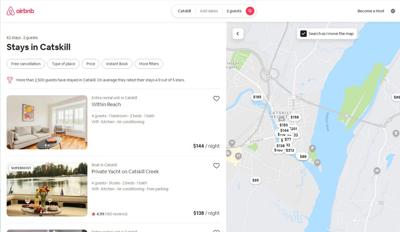CATSKILL — The Village of Catskill has rounded out regulations for short-term rentals such as Airbnbs by determining the cost of operation.
The village board of trustees in vote of 3-0 with one trustee absent passed a resolution establishing short-term rental fees. The village required short-term rental owners to obtain a permit and comply with certain standards to operate in the village as of November 2020, Trustee Natasha Law said in a statement.
Owners can apply for a permit for $375 and are subject to an inspection by the village Code Enforcement Officer. The fee for annual reinspections is set at $125, according to the resolution.
Law said the implementation of such fees is “crucial.”
“Owning an STR (short-term rental) is a business,” Law said. “Just like the barbershop, the insurance company, your favorite restaurant and the juice bar are all businesses. They are making a profit by renting out their homes. Whether it be an apartment, a room or the entire house. All businesses are required to have annual fire inspections, health inspections, pay insurance and other fees in order to be able to operate, so why should an STR be any different?”
The short-term rental industry has also had an impact on the housing crisis in the Twin Counties, she said.
“Affordable, workforce housing for those in our community is almost nonexistent. There isn’t housing left for the average person in our community that’s attending community college and needs a residence or the senior whose spouse passed away and can no longer manage an entire house and wants to cut down on their living expenses,” Law said.
There are more than 9,000 second homeowners in the county, according to a study by Greene County Economic Development and Planning Department.
Greene County had 45,300 Airbnb guest arrivals in the summer of 2019 and ranked third in the Capital Region for guest arrivals.
Greene County and Columbia County have more than 1,000 Airbnb units each, according to the state Hospitality and Tourism Association.
A 2018 study by I Love New York estimated that Airbnb rentals represented 50% of the county’s lodging income.
The imposed fees are a minimal cost to the owners, Law said, as owners could cover the cost from one or two nights of renting.
Regulations include having adequate off-street parking to accommodate maximum occupancy and have permits expire after one year. Copies of permits must be provided to every adjacent property owner, including those across the street.
After submitting an application, the village Code Enforcement Officer has 60 days to review it, according to the regulations.
Hudson also enacted short-term rental regulations in November 2020. Under the local law, short-term rentals are permitted in Hudson if a resident of the city operates up to three units on the same parcel where the resident lives.
A person who owns a residence in Hudson and lives there at least 50 days of the year may operate it as a short-term rental unit for a maximum of 60 days per calendar year.
Limiting short-term rentals will help preserve the supply of residences available for longer-term rentals or home ownership in the city, as well as maintaining the traditional character of the neighborhoods, according to Hudson’s law.
Hudson Common Council President Thomas DePietro said at the time that the law would indirectly impact affordable housing because having a lot of short-term rentals takes rentals off the housing market, he said.
“It’s an effort to preserve community character and make Hudson a place that people want to visit and live in,” DePietro said.
Law said the short-term rental issue is widespread.
“It’s time the village, town and the county all sit at the table together and figure out how we are going to solve this,” Law said.









